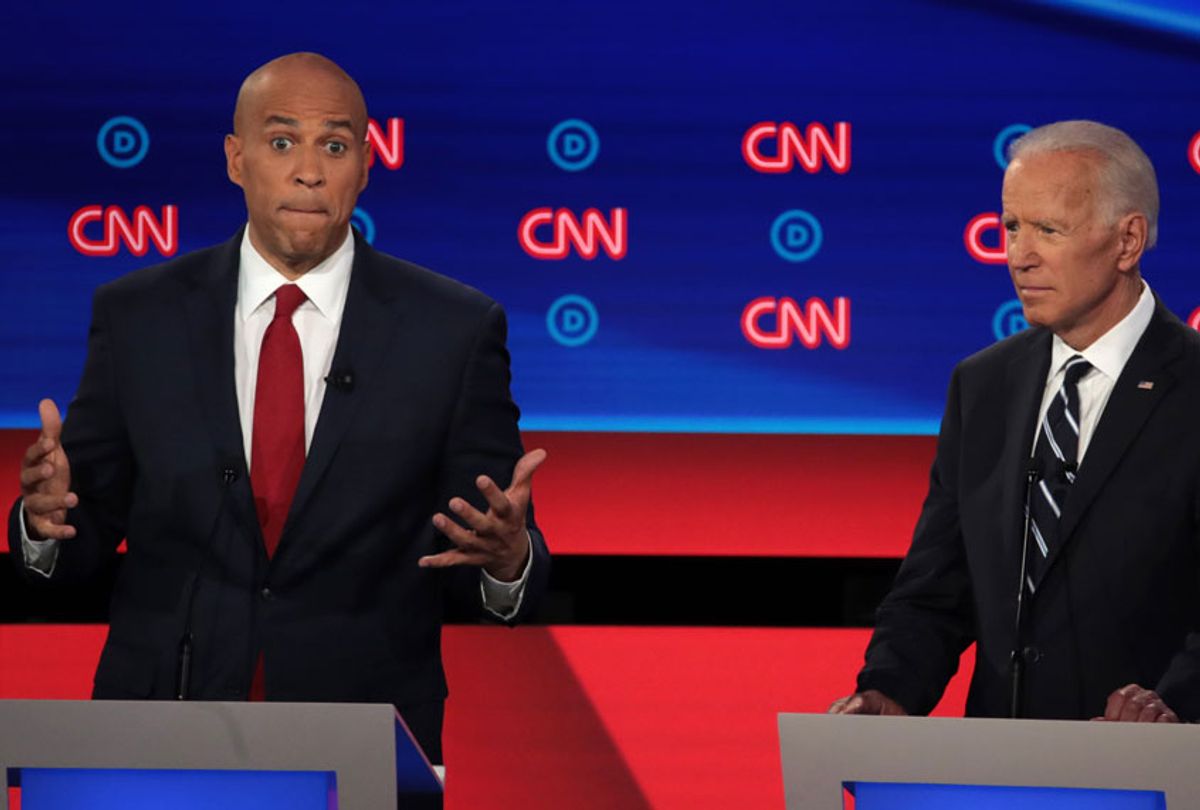It's probably too clever by half to say that the winner of the second night of the Democratic debates in Detroit was Elizabeth Warren. But it's hard to deny that, in a debate heavily focused on policy, the Massachusetts senator was sorely missed. She has an ability to marry policy smarts with human-person talk that was largely absent during this debate's lengthy exchanges over esoteric aspects of federal policy regarding health care and immigration.
Joking aside, there was a clear winner on the stage Wednesday night: Sen. Cory Booker of New Jersey.
Booker accomplished what he set out to do, which was to land a couple of real blows on former Vice President Joe Biden, particularly on the issue of criminal justice reform. Booker was successful at hanging the now-infamous 1994 crime bill around Biden's neck.
Biden clearly anticipated this, and launched into an attack on Booker's tenure as the mayor of Newark, when his administration became the target of an ACLU lawsuit. But it was clear, just from the big grin on Booker's face, that Biden wasn't succeeding on that front. Booker then leveled him with the best line of the night: "If you want to compare records, and frankly I'm shocked that you do, I am happy to do that," and proceeded to frame himself as the guy who cleaned up Biden's mess.
Still, this debate was simply missing the passionate clash over values that characterized the first night, which pitted Warren and Sen. Bernie Sanders of Vermont against a bunch of centrists who have little to no chance of actually winning. While there was a great deal of intra-party criticism on the second night, at no point did it feel like we witnessed a true clash of values.
Biden, the moderate who has led in the polls since this campaign started, knew better than to frame his policy ideas in terms that emphasize the modesty of the goals. He largely avoided scolding progressives for thinking too big, instead leaning — as he did last month in Miami — on his association with Barack Obama, and minimizing the fact that Biden's instincts were generally more conservative than the beloved former president's.
Biden seemed more alert and focused than he had during the first debate, but that doesn't mean he did well. On the contrary, his efforts to attack other candidates largely failed to land. The one exception was his rebuttal to an odd accusation of sexism from Sen. Kirsten Gillibrand of New York, when Biden was able to frame her as a naked opportunist grasping at straws. At various times, Biden seemed to lose his train of thought, and, as in the last debate, reverted to talking points about his time with Obama as an all-purpose crutch.
That in turn gave Booker another opportunity to burn Biden again, saying, "You invoke President Obama more than anybody in this campaign," and accusing him of only doing so when it's convenient. But the larger point, which is that Biden is basically drafting on Obama's coattails, was heard loud and clear.
Indeed, Booker did so well in his face-offs against Biden that Biden, reverting to his jokey Uncle Joe mode, called Booker the "future president." It was clearly meant to be condescending, but it backfired: Booker looked more presidential than Biden did in that moment. Biden seemed to realize that as soon as the phrase slipped out of his mouth, but by then it was too late.
Sen. Kamala Harris of California had a great deal riding on this debate, as she created the most dramatic moment of last month's debates when she attacked Biden's record on race. Overall, she failed to replicate that success, although she did get passionate once again when asked by the CNN moderators if she stood by her support for desegregation through busing.
Still, while it wasn't Harris' most exciting performance, she quietly demonstrated one of the most interesting arguments in her favor: She holds up well against criticism.
Harris was attacked nearly as much as Biden Wednesday night, showing that the other candidates clearly see her as a frontrunner, even if the polls don't show it yet. The criticisms were as varied as they were frequent. Biden tried to go after Harris on her perceived failures as California's attorney general. Multiple candidates tried to attack Harris' health care plan, which seeks to split the difference between Medicare for All and Obamacare. CNN's moderators tried to go after Harris for her willingness to decriminalize illegal border crossings.
Frankly, none of that stuck. The criticisms of Harris's record and plans seemed confusing and nit-picky, and even if they were legitimate, it was simply too difficult for most people — even policy wonks — to follow along. Efforts to paint Harris as a "cop" (from both the left and right) are bound to backfire, since she is literally trying to oust a criminal from the White House, a point she emphasized during her closing remarks.
This ability to dodge attacks is not to be underestimated. Donald Trump's plan is to run a fully negative campaign that is entirely focused on discrediting his opponent. Harris' secret weapon may be that it's hard to make that stick to her.
Above all, the main takeaway from the debates is that two nights and 20 candidates is too many. It's only half-joking to say that Warren won simply by being absent from the stage on Wednesday. The truth is that this won't get interesting until the time-wasters polling below 2% are gone and the sturdier candidates can all be on the same stage, having a go at each other. Democrats are fortunate to have so many options who can run robust campaigns against Trump. But it's time to have real debates that involve all of them, all at once.



Shares